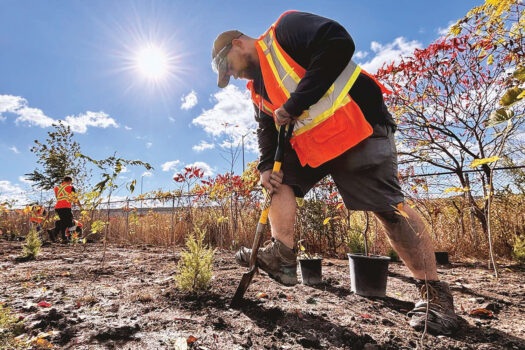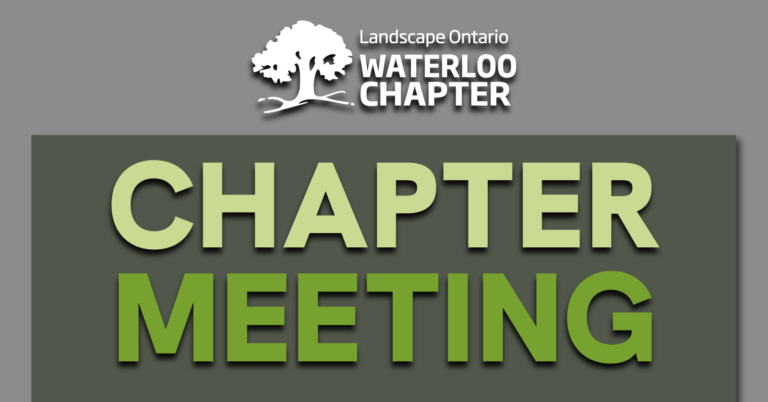Landscape Ontario has issued a statement that its lawn care members cannot support the draft regulations for the Cosmetic Pesticides Ban Act, 2008, released on November 7, 2008 by the Ontario government.
“If these proposed directions are followed in the final regulations, our industry will have no ability to deal with insect infestations when they occur on clients’ proprieties,” states a call to action to Landscape Ontario’s 2,000-plus members.
The association’s lawn care commodity group is requesting members to call their local MPP and either speak with them by phone or book a time to meet at their constituency office. As well, “Members should encourage all of their employees, as well as family, friends, suppliers and clients to phone, write or e-mail their MPP”
Members are asked to submit a written response to the Environmental Bill of Rights (EBR) Registry posting of the draft Regulations (New General Regulation under the Pesticides Act, 1990 to implement the Cosmetic Pesticides Ban Act, 2008). See website: http://www.ebr.gov.on.ca/ERS-WEB-External/displaynoticecontent.do?noticeId=MTA0OTk2&statusId=MTU3MjYz&language=en.
“Although LO originally supported the intent of the cosmetic ban, it was conditionally based on licensed, IPM Accredited technicians being able to use two low risk products for serious infestations. We believe this is a reasonable request,” says Tony DiGiovanni, LO’s executive director.
Commodity group members say that no viable, effective alternative solution exists to control the wide range of insect pests threatening our green spaces. The group was unanimous in asking, “If alternative solutions exist, what are they?” Members, all professionals in lawn care, say that the government continues to point to alternatives for pest control, but none exist, nor are there any that are visible off on the horizon on the long road required for product approval.
Other concerns listed by the professional members of LO include inadequate notice of the final rules and allowing the retail sale to home- owners of otherwise banned pesticides labeled for lawn and garden insect control, while banning professional use.
The members of the commodity group have outlined four points as possible solutions to the pesticide proposals. A complete list of the solutions and LO’s official call follow on this page and on page 7.
LO’s official call to action
The following is the official call to action by Landscape Ontario’s Lawn Care Commodity group: The draft regulations under the Cosmetic Pesticides Ban Act, 2008, released by the government on November 7, are completely unsatisfactory to Landscape Ontario and the professional lawn care industry. If these proposed directions are followed in the final regulations, our industry will be unable to deal with insect infestations on clients’ proprieties.
The executive of the Lawn Care Commodity Group will be involved in a direct meetings and discussion with the Minister of the Environment, the Premier’s Office and other senior government officials. At the same time, we need both the Ministry and MPPs to be fully aware of how upset people in the industry are, and the dire consequences these proposed policies will have on lawns across the province.
That means we need the immediate, active involvement of everyone in the industry to counter this proposed policy — you, your employees, suppliers, family and colleagues. There are a number of simple steps you must take to preserve your business:
- Call your local MPPs and either speak with them by phone or book a time to meet at the constituency office. Over emphasize the direct impact on your business and homeowners in your Member’s riding. Approach both your home riding’s MPP, as well as the MPP where your business is located. Most MPP offices will take meetings if you do significant business in their riding – i.e. anywhere you have customers – but some insist on a local address. You can find your MPP’s contact information at http://www.ontla.on.ca/web/members/member_addresses.do?AddType=CONT&locale=en. If you do not know either name, go to the Postal Code lookup function at Elections Ontario at http://fyed.elections.on.ca/fyed/en/form_page_en.jsp , then go back and plug the riding name into the member search list. If you have any difficulty, call Counsel Public Affairs at 416-920-0716, ext. 223 (Marisa Lamont) or 224 (Katie Robb).
- Encourage all of your employees (as well as family, friends, suppliers and clients you are willing to approach) to phone, write or e-mail their MPPs. Pass along the talking points but do not provide a form letter. To be effective, they should make the case in their own words.
- Submit a written response to the Environmental Bill of Rights (EBR) Registry posting of the draft Regulations (New General Regulation under the Pesticides Act, 1990 to implement the Cosmetic Pesticides Ban Act, 2008). Your written responses must be submitted by midnight on December 21, 2008. The regulations and details on how to submit electronically or by mail are at www.ebr.go.on.ca. The Registry number to enter is 10-5080. Your submission can be as short or long as you want; the important point is to speak to the key issues and the problems with the proposed direction.
No one else will speak up on your behalf. The industry must make our voices heard!
Draft Regulations – Communication Points
(Ed. note: These are speaking points that can be used in conversation with your MPP, so that Landscape Ontario members are speaking about the pesticide ban in a unified, collective voice).
Landscape Ontario does not support the draft regulations as currently written.
- They do not allow solutions that will prevent the destruction of Ontario’s lawns and landscapes from damaging pest infestations.
- They do not create a level playing field.
Damaging insect infestations
- Viable, effective alternative solutions do not exist to control the wide range of insect pests threatening our green spaces. If they exist, what are they?
- While some may argue a few weeds in a lawn is deemed cosmetic and the use of a traditional herbicide to control them is non-essential, there can be no argument that damaging insect infestations that risk the destruction of our lawns and landscapes goes beyond cosmetic.
Inadequate notice of the final rules
- The EBR consultation will not be completed until Christmas. Final regulations are unlikely to be available until March.
- It would be unreasonable and unduly punitive for the government to expect an industry to comply with such drastically amended regulations within such a short time frame.
- The lawn care industry cannot suspend business operations waiting for finalized regulations. These business operations include:
- Contractual obligations
- 2009 customer retention initiatives and pre-payment transactions
- Marketing material and strategies
- Program structures and pricing
- Adjustments to staff recruitment and training
- Product purchasing needs
- Equipment purchase / modification needs
- Provides time for public education
- Existing pesticide inventories must be dealt with, which requires time to utilize stock and/or arrange safe collection and disposal.
Level playing field
- The draft regulations allow the retail sale of otherwise banned pesticides labeled for lawn and garden insect control, while banning professional access to similar commercial products.
- Class 7 (Restricted Domestic Class) contains several pesticides including, to name a few:
- Ortho Grub-B-Gone Max Grub Eliminator Ready-To-Spray (PCP # 27206) containing carbaryl.
- Bug-B-Gone For Lawns, Trees, Gardens Ready-To-Spray (PCP # 27207) containing carbaryl.
- Ortho Bug-B-Gone Max Ant and Chinch Bug Eliminator Concentrate (PCP # 27208) containing carbaryl.
- Scotts Ecosense Insecticide Concentrate (PCP # 28404) containing pyrethrins. This is essentially the same as Trounce (PCP # 28680 and 28681) currently under Class 8.
- To suggest that retail sale of these products can resume, as the label allows use on other ‘non-cosmetic’ pests, is essentially instructing the Ontario public to disregard the Health Canada approved label instructions.
Solutions
1. Provide regulations to allow the prescribed use, by licensed professionals, of two otherwise banned pesticides on the Class 9 list.
- Imidacloprid (for grub control)
- Deltamethrin (for chinch bug and sod webworm control)
This prescribed use would be conditional upon requirements as outlined in the Landscape Ontario document “Prescribed Use Compliance Criteria and Protocols” previously submitted to the Ministry of Environment. These conditions include:
- IPM Accreditation (similar to what the draft Regulations outline for golf courses) and the operational requirements associated with it.
- Insect infestations must exceed threshold levels, as currently outlined by Ministry of Agriculture Food and Rural Affairs, before the Class 9 pesticide can be considered for use.
2. Remove pyrethrins from the Class 9 banned list
- Pyrethrins are currently exempt under all Ontario pesticide by-laws.
- Domestic pyrethrin products currently available provide the homeowner a do-it-yourself solution, specifically Trounce For Lawn (PCP # 28680 and 28681).
3. Remove products that are on Health Canada Reduced Risk list from the Class 9 banned list.
- Inclusion of Health Reduced Risk products on the Ontario banned list will be a road block to the future development and introduction of reduced risk products in Ontario.
- This must provide clear criteria, and not an arbitrary decision framework. This legislation must not hinder the development of low risk, alternative, products. As currently written, it will.
4. Allow for a phase-in of Section 17 of the Regulations (Class 9 banned list).
- Given that regulations will not be finalized until well into the New Year, a phase-in period is required to allow business to plan, price and market.
- Allowing a phase-in will prevent the needless environmental impact of pesticide waste disposal. The Health Canada amendment of pesticide labeling customarily involves a reasonable phase-in period to allow products with expired labels to be used accordingly. Municipal pesticide by-laws typically involve a phase-in period.
- The availability or development of alternative products requires a phase-in period.








